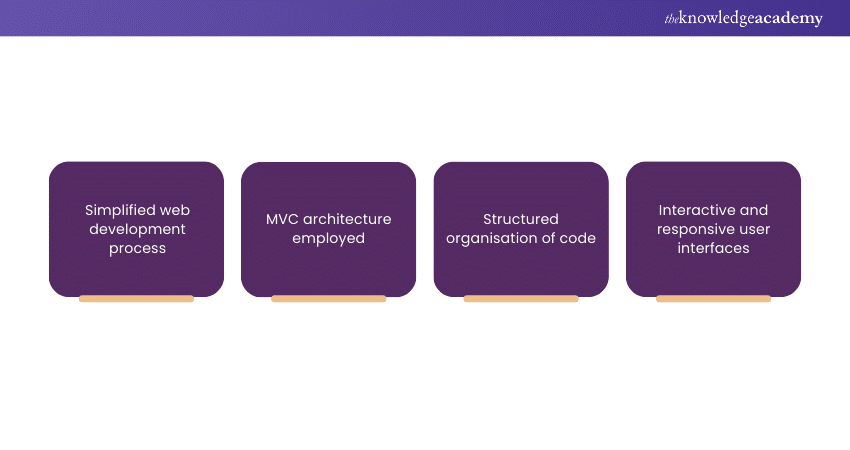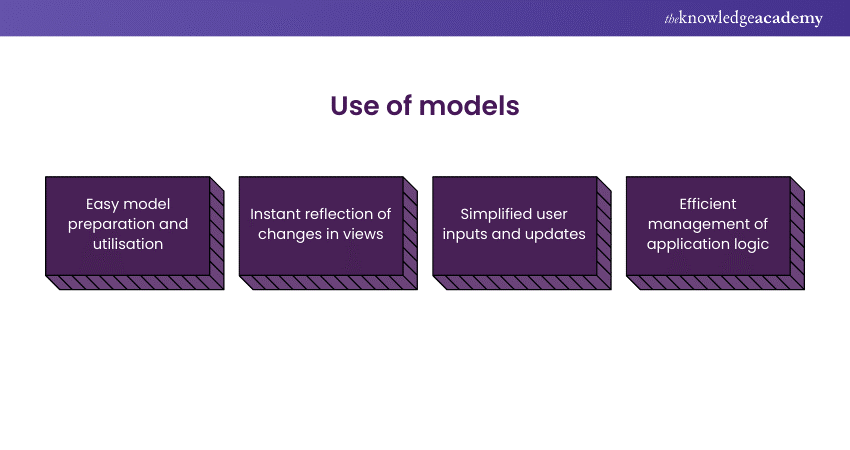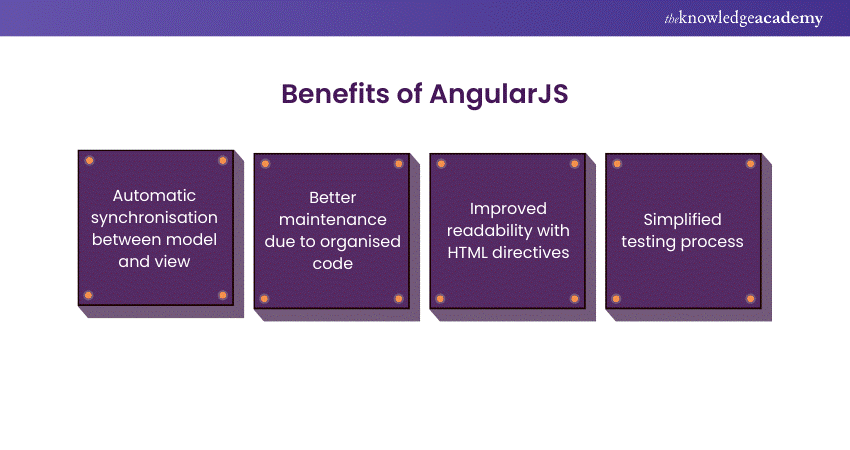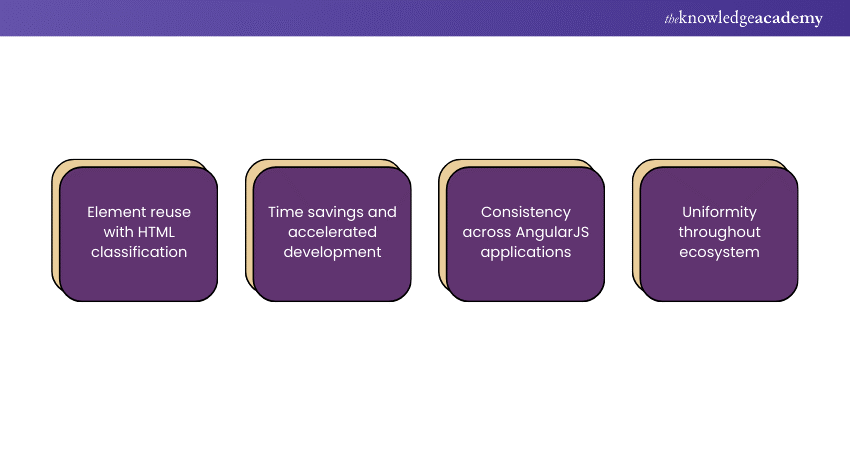We may not have the course you’re looking for. If you enquire or give us a call on 01344203999 and speak to our training experts, we may still be able to help with your training requirements.
Training Outcomes Within Your Budget!
We ensure quality, budget-alignment, and timely delivery by our expert instructors.

AngularJS is a powerful JavaScript framework widely used for building dynamic web applications. It simplifies the development process by providing a structured framework for creating client-side applications. At its core, AngularJS extends HTML with additional attributes and binds data to HTML with expressions. AngularJS is a popular open-source front-end web application framework developed by Google, renowned for its ability to create dynamic, single-page web applications.
Table of Contents
1) What is AngularJS?
2) How does AngularJS work?
3) Why make use of AngularJS?
a) Simple to use
b) Time-efficient
c) Prepared to utilise a model
4) Features of AngularJS
a) MVC
b) Data model binding
c) Less code
d) Unit testing
5) Benefits of AngularJS
6) Exploring AngularJS capabilities
a) Enables Unit Testing and Dependency Injection
b) Encourages code reusability
c) Simplified MVC Pattern
d) Enhances HTML-based user interfaces
e) Effective directives management
7) Conclusion
What is AngularJS?
AngularJS, created by Google, stands as a potent and open-source JavaScript framework extensively utilised in constructing dynamic, single-page web applications. Emerged in 2010, it streamlines the web development process by furnishing a structured framework for crafting resilient and easily maintainable applications.
Fundamentally, AngularJS embraces a declarative approach, enabling developers to articulate the logic of their applications with precision. It introduces the concept of two-way data binding, ensuring a seamless synchronisation between the model and the view. This bidirectional data flow guarantees instantaneous reflection of any alterations in the user interface within the underlying data model, and vice versa.
Built upon the Model-View-Controller (MVC) architecture, AngularJS advocates for a modular and well-organised codebase. The framework incorporates HTML as a declarative language, expanding its syntax through directives that augment the web page's functionality. These directives empower developers to generate dynamic content, manage user events, and effortlessly oversee the Document Object Model (DOM).
Moreover, AngularJS streamlines the creation of single-page applications (SPAs), where content dynamically loads and updates as users engage with the application, resulting in a more seamless and responsive user experience.
Armed with a robust feature set encompassing dependency injection, testing support, and a vibrant community, AngularJS continues to be the preferred choice for developers seeking efficiency and maintainability in web application development.
How does AngularJS work?

AngularJS operates as a front-end, client-side JavaScript framework designed to simplify and enhance the process of building dynamic web applications. At its core, AngularJS employs a Model-View-Controller (MVC) architecture, providing a structured approach to organising code and separating concerns for improved maintainability.
The framework facilitates the creation of interactive and responsive user interfaces by introducing the concept of two-way data binding. This mechanism ensures a seamless connection between the application's model, which represents the underlying data, and the view, which corresponds to the user interface. Any changes made in the view instantaneously update the model, and vice versa, creating a dynamic and synchronised user experience.
AngularJS leverages directives, which are extended HTML attributes, to enhance the functionality of web pages. These directives allow developers to embed additional behaviours into the HTML, such as handling events, manipulating the DOM, or creating reusable components. This declarative approach simplifies the code structure and improves readability.
Furthermore, AngularJS employs dependency injection to manage and organise components efficiently. This feature enhances modularity and testability, allowing developers to inject dependencies seamlessly and replace them as needed. Overall, AngularJS revolutionises web development by providing a comprehensive framework that streamlines the creation of robust, maintainable, and interactive single-page applications.
Why make use of AngularJS?
AngularJS should be used for web development due to its powerful features, including two-way data binding, modular architecture (MVC), and a rich set of directives. It simplifies code organisation, enhances maintainability, and fosters the creation of dynamic, single-page applications, making it an ideal choice for efficient and scalable web development projects:
a) Simple to use
AngularJS simplifies web development with its straightforward usage. Developers define dynamic content using simple HTML tags enhanced with AngularJS directives. The framework's two-way data binding ensures real-time synchronisation between the model and view, reducing the need for manual DOM manipulation.
Moreover, creating controllers to manage application logic and views to handle user interfaces is intuitive. Overall, AngularJS's simplicity lies in its ability to enhance HTML with declarative syntax, making it accessible for developers to create dynamic and responsive web applications effortlessly.
b) Time-efficient
AngularJS significantly enhances time-efficiency in web development. Its modular structure and MVC architecture streamline code organisation, enabling faster development and easier maintenance. The two-way data binding reduces manual handling of updates, saving developers from repetitive tasks.
More importantly, the framework's rich set of features, including directives and dependency injection, accelerates the development process. Additionally, AngularJS's comprehensive documentation and a vibrant community provide ready solutions, further expediting troubleshooting and problem-solving. Overall, AngularJS empowers developers to create robust applications efficiently, saving time and resources.
c) Prepared to utilise a model

In AngularJS, preparing and utilising models is a straightforward process crucial for dynamic data management. Developers define models to represent application data, establishing a clear structure.
Through two-way data binding, any changes in the model are instantly reflected in the view and vice versa, ensuring real-time synchronisation. This seamless interaction simplifies handling user inputs and updates.
Moreover, by incorporating models within controllers, developers efficiently manage application logic, fostering a well-organised structure that enhances readability and maintainability in AngularJS applications.
Features of AngularJS
AngularJS boasts features like two-way data binding, modular MVC architecture, directives for enhanced HTML functionality, dependency injection for efficient component management, and seamless support for creating dynamic single-page applications.
a) MVC
Model View Controller (MVC) is an architectural pattern utilised in software development, comprising three integral components:
a) Model: Serving as the application's data and logic manager, this component incorporates a database. It responds to requests from the View and instructions from the Controller to update itself.
b) View: Tasked with presenting application data to users, the View constitutes the user interface. It utilises AngularJS expressions to render necessary data effectively.
c) Controller: Facilitating communication between the Model and View, this component validates input data through implemented business logic, manipulating the data model's state to ensure seamless interaction.
b) Data model binding
In AngularJS, data binding operates bidirectionally, implying that the view layer of the MVC architecture precisely mirrors the model layer. Unlike other MVC architectures where constant updating of the view and model layers is required for synchronisation, AngularJS ensures that the model layer and view layer stay harmonised.
More importantly, any alterations in the model prompt immediate and automatic updates in the view, and vice versa, eliminating the need for additional code to bind data to HTML controls and ensuring constant synchronisation between the model and view.
c) Less code
In the conventional approach, extensive JavaScript code is necessary for Document Object Model (DOM) manipulation. However, AngularJS streamlines this process, requiring significantly less code to achieve comparable or enhanced functionality. This efficiency in code writing is a distinctive advantage of AngularJS, enabling developers to accomplish complex tasks with brevity and simplicity.
d) Unit testing
All developers recognise the significance of unit testing, and for AngularJS, the Karma framework proves invaluable for executing such tests effortlessly. Tailored by Google for AngularJS, Karma simplifies the process, allowing developers to create reliable tests effortlessly, ensuring the robustness and stability of AngularJS applications with ease.
Benefits of AngularJS
The following are the benefits of AngularJS:

a) Two-way data binding: Enables automatic synchronisation between the model and view layers.
b) Modular MVC architecture: Promotes organised code structure for better maintainability.
c) Declarative UI: Enhances readability by incorporating HTML directives.
d) Dependency injection: Facilitates efficient management of components, promoting modularity.
e) Single-Page Application (SPA) development: Streamlines dynamic content loading for a seamless user experience.
f) Rich Set of Directives: Allows for extended HTML functionality, easing DOM manipulation.
g) Efficient Unit Testing with Karma: Simplifies the testing process for reliable application development.
Exploring AngularJS capabilities
AngularJS, a JavaScript framework, empowers developers with features like data binding, routing, and dependency injection for creating dynamic web applications. It simplifies development through its structured framework, enabling the creation of interactive, responsive, and modular web interfaces with ease:
a) Enables unit testing and dependency injection
AngularJS applications include built-in dependency injection, aiding developers in rapid application development, testing, and comprehension. Prior to AngularJS, testing was arduous and time-consuming. Thus, AngularJS streamlines testing through Dependency Injection, breaking down code into testable components to swiftly identify and resolve issues. This interconnectedness ensures smooth functionality across various elements through mock assessments.
b) Encourages code reusability

AngularJS development facilitates HTML classification for element reuse, allowing developers to recycle existing code efficiently. Code reusability saves significant time, accelerating development while maintaining consistency across AngularJS applications. This approach ensures faster development and promotes uniformity throughout the application ecosystem.
c) Simplified MVC Pattern
In a traditional MVC application, the Model layer manages data, the View layer displays it, and the Controller links the two. AngularJS simplifies MVC implementation by automatically integrating these elements. Developers simply divide the application into MVC components, letting AngularJS handle the rest, reducing development time significantly. Exciting, isn't it?
d) Enhances HTML-based user interfaces
Another compelling aspect of Angular JS development is its utilisation of HTML for building user interfaces. HTML, being a universally loved and straightforward declarative language, is easy to adopt for those from a technical background. AngularJS employs concise and intuitive tags to construct well-organised user interfaces efficiently.
e) Effective directives management
AngularJS extends its capabilities by leveraging directives in conjunction with HTML, providing developers with a multitude of additional features and functionalities. These components are seamlessly accessible through the Document Object Model (DOM), eliminating the need for simulation. Consequently, developers can effortlessly create feature-rich web pages for website or web app development services.
Create powerful dynamic web content by signing up for our AngularJS Developer Course now!
Conclusion
In conclusion, AngularJS, with its powerful features like two-way data binding, modular MVC architecture, and rich directives, revolutionises web development. It answers the question What is AngularJS by offering a dynamic and efficient framework, empowering developers to create responsive, maintainable, and feature-rich single-page applications with ease.
Frequently Asked Questions

AngularJS is used for building dynamic, single-page web applications. Developed by Google, it simplifies the web development process by providing a structured framework. With features like two-way data binding, modular MVC architecture, and a rich set of directives, AngularJS enhances the efficiency and maintainability of applications.

In AngularJS, three main components are essential:
a) Model: Represents the application's data and logic.
b) View: Displays application data through the user interface, using AngularJS expressions.
c) Controller: Bridges communication between the Model and View, validating input data and implementing business logic.

The Knowledge Academy takes global learning to new heights, offering over 30,000 online courses across 490+ locations in 220 countries. This expansive reach ensures accessibility and convenience for learners worldwide.
Alongside our diverse Online Course Catalogue, encompassing 17 major categories, we go the extra mile by providing a plethora of free educational Online Resources like News updates, Blogs, videos, webinars, and interview questions. Tailoring learning experiences further, professionals can maximise value with customisable Course Bundles of TKA.

The Knowledge Academy’s Knowledge Pass, a prepaid voucher, adds another layer of flexibility, allowing course bookings over a 12-month period. Join us on a journey where education knows no bounds.

The Knowledge Academy offers various App & Web Development Courses, including Angular JS Developer, Mobile App Development Course, JavaScript & JQuery Masterclass. These courses cater to different skill levels, providing comprehensive insights into the Top 12 Web Developer Skills You Should Have.
Our Programming & DevOps Blogs cover a range of topics related to App & Web Development, offering valuable resources, best practices, and industry insights. Whether you are a beginner or looking to advance your App & Web Development skills, The Knowledge Academy's diverse courses and informative blogs have you covered.
Upcoming Programming & DevOps Resources Batches & Dates
Date
 AngularJS Developer
AngularJS Developer
Fri 28th Feb 2025
Fri 4th Apr 2025
Fri 27th Jun 2025
Fri 29th Aug 2025
Fri 24th Oct 2025
Fri 5th Dec 2025







 Top Rated Course
Top Rated Course



 If you wish to make any changes to your course, please
If you wish to make any changes to your course, please


